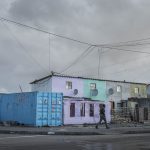And the poor suffer what they must?
The latest national budget suggests a turn to austerity. But that tactic has failed, most recently in Europe, where limited tax increases favoured the rich, not the poor.
Author:
20 March 2019

There are few signs of changing economic fortunes for South Africa. By the end of 2019 the economy would have grown by 1.7%, modestly increasing to 2.1% by 2021. That growth, moreover, is predicated on an accumulation path that is not generating rapid employment and meeting the imperative to resolve income and wealth inequality.
President Cyril Ramaphosa acknowledged the need for “radical economic transformation” in his state of the nation address, denuding the Jacob Zuma-era content of the phrase but nonetheless recognising its material legitimacy. There is a sound rationale for doing so. As the Bell Pottinger scandal illustrated, our society remains ripe for manipulation by nefarious political forces if our economic challenges of poverty, unemployment and inequality are not resolved.
Yet the 2019 budget speech, and the government’s overall stance on fiscal policy, may undermine the necessary efforts to transform our economic reality and shield us from social and political crisis.
Much has been made about the growing fiscal deficit rising from 3.6% to 4.2% this year, the widest in a decade. Gross government debt will be 55.6% in 2019 and increase to 58.9% of GDP in 2021/2022.
Related article:
Before the delivery of the budget speech, some economists had already warned that South Africa is on the verge of falling off a “fiscal cliff”. They have ramped up the volume since, in a rather alarmist manner, reminiscent of the Republican fervour that led to a government shutdown under the Obama administration in the US. But they base their position on the grounds of economic concern.
Their argument is simple enough: fiscal discipline is necessary for economic prosperity, rising public debt is bad for growth, the state should “tighten its purse strings” and big government is bad government, among other variations on these themes.
While economists (see here for example) have contradicted that view, questioning the neoclassical economics and empirical evidence that undergird it, our finance ministry seems to concur. The budget contains significant cuts to social programmes (including housing, education and healthcare), below-inflation increases to social grants, and fuel and road accident fund levy increases. In addition, there is now pressure on government employees to secure an early retirement as the Treasury plans to reduce the public sector wage bill by R37bn over the next three years.
The pledge to set aside R69bn to Eskom is not an example of proactive state spending. It falls well short of what is needed need to stabilise its finances. One can expect more struggles and job cuts at Eskom.
Related article:
The budget made these adjustments while implementing no tax increases for the wealthy, none for corporate and capital gains, and no detailed outline of a plan to halt illicit financial flows.
As our major trade union federations (Cosatu and Saftu) and a number of commentators and organisations have noted, the fiscal squeeze is being felt by those who can ill afford it – the poor and working class. Moreover, on matters of health and education, there is a worrying gap between rhetorical pledges to improve infrastructure and capacity, and the actual monetary commitments made to doing so in the budget.
In a context of high unemployment, poverty and inequality, is this not a recipe for disaster? Well, it depends on how you look at it.
In the words of the budget speech “fiscal prudence is the basis of economic recovery”. In this view the shocks that come with a fiscal squeeze will ultimately contribute to providing the necessary stability for future economic prosperity.
Related article:
Although the conservative fiscal view did not always enjoy the common sense status it does today, as revealed in the Golden Age of social democracy in the immediate post-World War II era, it continues to dominate the airwaves. Indeed, reporting on parliamentary submissions on the budget has given more space to those advocating even harsher fiscal consolidation, at the expense of those submitting considered alternative views.
Nonetheless, “fiscal prudence” is increasingly being contested in economic policy debates. These are debates that the public should be aware of before succumbing to panic engendered by talk of an imminent fiscal and economic collapse.
For example, a recent study conducted by the Institute of International Finance has contradicted the prevalent fiscal conservative view. Comparing the US and European responses to the global financial crisis, the study reveals that America’s embrace of fiscal expansion led to relatively higher levels of economic growth, while the European emphasis on cutting deficits and debt ratios undermined economic recovery in the region.
There are signs that a new consensus is emerging, as European countries seem to be abandoning austerity en masse. Portugal, for example, rejected cuts to wages, pensions and social security in 2015 and has since put its economy on an upward trajectory. Portuguese economic growth reached its highest level in a decade in 2018, further debunking the view that “fiscal prudence” provides the only path out of economic crisis.
Related article:
There are many positives to take away from Finance Minister, Tito Mboweni’s maiden budget speech, including its commitment to curb wasteful expenditure and confront corruption in the public service. Yet the broader economic transformation we need will not emerge from an underlying commitment to fiscal prudence. As another South African economist puts it, the worldview underpinning fiscal conservatism has “not worked anywhere in the interests of the poor and the working class, but one that has served only the interests of rentiers and their ilk”.
The latter point deserves emphasis. Most South Africans would agree that inequality is a growing issue of concern. And while the government has pledged to close the inequality gap, the budget provides little promise of being capable of doing so. Indeed, its failure to consider a wealth tax and a rise in corporate and capital gains tax, its hints at the possible privatisation of our state-owned enterprises, and the cuts to public services, contribute to an overall macroeconomic policy mix, which several IMF economists have recently fingered as being responsible for rising inequality across the globe.
The budget acknowledges the social and political risks of our current economic malaise. Yet, unless the current principles informing our fiscal dispensation are not challenged, we will enter into a depressing annual cyclical loop: the economy slows, the fiscal belt tightens, the economy slows further, and the belt tightens, and so on, with the poor and vulnerable shouldering the costs.
Michael Nassen Smith is the deputy director of the Institute for African Alternatives. He is the editor of a recently released book, Confronting Inequality: The South African Crisis.
He writes in his personal capacity.




